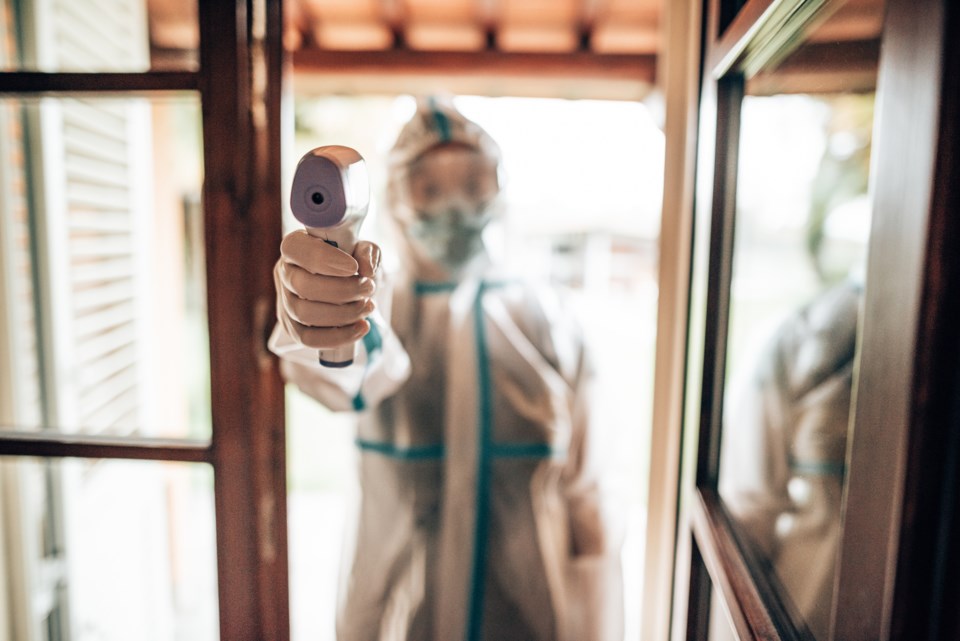The steady decline in new COVID-19 infections in B.C. has pushed the number of those in the province actively fighting infections down to 2,876 – the fewest since August 6, exactly four months ago.
Health officials have detected 946 new infections in the past three days, including 351 on December 4, 311 on December 5, and 284 in the past 24 hours.
The government usually discloses fewer new COVID-19 infections on Mondays because lab technicians perform fewer tests on Sundays. The 9,398 tests conducted in the past day mean that the positive-test rate for that day was higher than 3%, while for much of the past week that rate was below 3%.
The 284 cases detected in the past 24 hours is the second-lowest one-day count since August 3, only to last Monday, November 29, when lab technicians had detected 272 new infections.
Serious COVID-19 infections have also been on the decline, with 241 people with the disease in B.C. fighting for their lives in B.C. hospitals – the lowest such total since September 3, more than three months ago.
Of those hospitalized with COVID-19, 89 have severe enough infections to be in intensive care units (ICUs), which is the lowest number since August 27.
Unfortunately, the 11 COVID-19 deaths across the province in the past three days stand as evidence of how deadly the disease can be. The province's pandemic death toll is now 2.362.
Those 11 new deaths include:
• five in Fraser Health;
• two in Interior Health; and
• four in Northern Health.
Of the 220,530 people known to have been infected with the disease since the first case was discovered in the province on January, 28, 2020, 215,190 people, or 97.6%, are considered by the government to be recovered.
The B.C. government usually considers COVID-19 patients to have recovered if they have gone 10 days following first feeling symptoms, as they are therefore deemed to no longer be infectious. Some patients, however, continue to have health problems for months after their recoveries.
The 946 new cases detected in the past day includes:
• 285 in Fraser Health;
• 138 in Vancouver Coastal Health;
• 211 in Interior Health;
• 115 in Northern Health; and
• 197 in Island Health.
The 2,876 active cases include:
• 927 in Fraser Health;
• 424 in Vancouver Coastal Health;
• 559 in Interior Health;
• 342 in Northern Health; and
• 624 in Island Health.
Unvaccinated people continue to be the ones most spreading the disease.
Between November 26 and December 2, people not fully vaccinated accounted for 58.3% of new cases, and between November 19 and December 2, those individuals accounted for 66.1% of hospitalizations.
This is despite the vast majority of British Columbians being fully vaccinated.
B.C. government data show that 4,261,317 residents have had at least one dose of vaccine, while 4,085,935, or 95.8% of those are fully vaccinated with two doses.
Children as young as five years old started to get vaccinated on November 29, and as a result there has been a jump in the number of new people getting their first doses of vaccine. There were 20,858 people who got their first dose of vaccine in B.C. in the past three days, for an average of 6,952.66 people per day. On November 30, the number of initial doses of vaccine in s 24-hour period had fallen to a months-low total of 964, according to government statistics.
Victoria estimates that 85.5% of eligible British Columbians, older than five years, have had at least one vaccine shot, while 82% of that eligible group is fully vaccinated with two jabs.
The B.C. government last year estimated in that the province's total population is 5,147,712, so Glacier Media's calculation is that more than 82.8% of B.C.'s total population has had at least one dose of vaccine, and 79.4% of the province's total population has had two doses.
Booster shots in B.C. have started to be given to immunocompromised people, those older than 70 years who have gone six months after their second dose, as well as to healthcare workers and those who received two AstraZeneca doses of vaccine, and have gone six months since their second dose. Others older than 18 years are expected to be allowed, in stages, to get booster doses in 2022.
So far, 492,236 people in B.C. have received their booster dose, according to today's data. That is 23,060 more than on Friday.
There were no new outbreaks at health-care facilities in the past three days. That leaves the province with five such outbreaks. •




